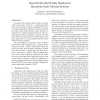123 search results - page 1 / 25 » Abstracting out Byzantine Behavior |
DAGSTUHL
2006
13 years 6 months ago
2006
EDM
2008
13 years 6 months ago
2008
Students can use an educational system's help in unexpected r example, they may bypass abstract hints in search of a concrete solution. This behavior has traditionally been la...
NSDI
2007
13 years 7 months ago
2007
Byzantine fault tolerant systems behave correctly when no more than f out of 3f + 1 replicas fail. When there are more than f failures, traditional BFT protocols make no guarantee...
OPODIS
2010
13 years 2 months ago
2010
: Provide application processes with strong agreement guarantees despite failures is a fundamental problem of fault-tolerant distributed computing. Correct processes have not to be...
SAGT
2009
Springer
13 years 11 months ago
2009
Springer
Abstract. A mechanism is manipulable if it is in some agents’ best interest to misrepresent their private information. The revelation principle establishes that, roughly, anythin...

